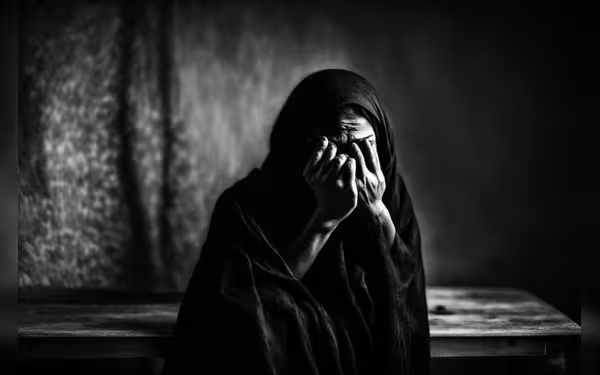Saturday, November 16, 2024 05:33 PM
Domestic Violence: A Threat to Pakistan's Democracy
- 80% of gender-based violence linked to domestic abuse.
- Children in abusive homes face lifelong consequences.
- Dysfunctional families reflect Pakistan's declining democracy.
 Image Credits: thefridaytimes
Image Credits: thefridaytimesDomestic violence in Pakistan threatens democracy, impacting families and children's futures.
In Pakistan, the issue of domestic violence is not just a personal tragedy; it is a societal crisis that threatens the very fabric of democracy. The family, often seen as the cornerstone of society, is increasingly becoming a battleground where violence and abuse are prevalent. This troubling trend has far-reaching consequences, not only for the individuals involved but also for the broader community and democratic values.
According to a recent report by the National Commission for Human Rights (NCHR), approximately 80% of the 63,000 gender-based violence cases reported in Pakistan were linked to domestic violence. However, the actual figures could be much higher, as many incidents go unreported. This alarming statistic highlights a critical issue: the public discourse surrounding domestic violence often focuses on the gender of the victim and the perpetrator, rather than the broader implications of such violence on society.
Domestic violence does not only affect the adults involved; it has a profound impact on children who witness or experience it. Research has shown that children raised in dysfunctional households are at a higher risk of developing mental health issues, such as anxiety and depression. They may also struggle to form healthy relationships in the future, often mimicking the abusive dynamics they observed in their homes. This cycle of abuse perpetuates itself, creating a generation that is desensitized to violence.
In the UK, the 2021 Domestic Abuse Bill recognized children as victims of domestic violence, not just witnesses. This acknowledgment is crucial, as it emphasizes the need for intervention and support for young individuals affected by such circumstances. In contrast, Pakistan's approach often reduces domestic violence to a "family matter," which only serves to silence victims and embolden abusers.
The psychological effects of growing up in an abusive environment can be devastating. Children may resort to harmful coping mechanisms, such as substance abuse, as they struggle to navigate their trauma. The stigma surrounding mental health in Pakistan further complicates this issue, as many individuals do not seek help due to fear of judgment.
Moreover, the dysfunction within families mirrors the current state of democracy in Pakistan. The Economist Intelligence Unit (EIU) downgraded Pakistan to an authoritarian regime in 2023, reflecting a decline in democratic values. Just as a dysfunctional household is characterized by violence, intimidation, and poor communication, these same traits can be observed in the political landscape of the country.
The concept of "learned helplessness" plays a significant role in this dynamic. When individuals are repeatedly exposed to stressful situations, they may feel powerless to change their circumstances, leading to inaction. This phenomenon can be likened to an elephant tied with a flimsy rope; despite its strength, it remains trapped due to a belief that escape is impossible. Similarly, children raised in abusive environments may internalize this sense of powerlessness, which can extend into their adult lives and influence their engagement with societal issues.
In contrast, countries that rank higher in democratic values often see their citizens actively protesting against injustices. Recent protests in Bangladesh and Sri Lanka serve as powerful examples of how individuals, particularly the youth, can mobilize for change when they recognize their strength. In Pakistan, however, the lack of significant public protests regarding pressing issues such as inflation, violence against minorities, and corruption may stem from a pervasive attitude of resignation.
Ultimately, addressing domestic violence is not just about protecting individuals; it is about safeguarding the future of society and democracy itself. By recognizing the interconnectedness of family dynamics and democratic health, Pakistan can begin to foster a culture that values human rights and empowers its citizens. It is imperative that we shift the narrative surrounding domestic violence from a private issue to a public concern, ensuring that every individual, especially children, can grow up in a safe and nurturing environment.













